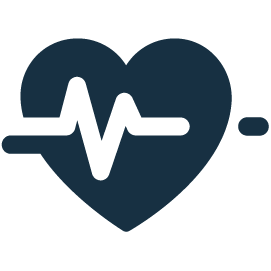What are your risks of having a heart attack?
Risk factors for cardiovascular diseases (CVDs) fall into three categories – major, modifiable, and contributing. The more risk factors you have, the greater your chance of developing coronary heart disease. By assessing these factors, you can learn how to manage them while focusing on prevention early in life.

Major risk factors
Significantly increase the risk of heart and blood vessel (cardiovascular) disease and can’t be changed.

Modifiable risk factors
Can be modified, treated, or controlled through medication or lifestyle changes.

Contributing risk factors
Usually associated with an increased risk of CVDs, but their significance and prevalence have yet to be determined.
Risk factors that can’t be changed
| Heredity/Family History of CVDs | If your family has a history of CVDs, it’s likely that you have one or more risk factors. Children of parents with heart disease are more likely to develop heart disease themselves. |
| Ageing | As women age, the risk factor begins at 55. After menopause, women are more likely to develop heart disease partly because their body’s production of oestrogen drops. Women who go through early menopause, either naturally or because they have had a hysterectomy, are twice as likely to develop heart disease compared to women of the same age who have yet to go through menopause. |
Risk factors that can be changed
| High blood cholesterol | High triglyceride levels along with low HDL cholesterol or high LDL cholesterol is associated with atherosclerosis – the build-up of fatty deposits inside artery walls – which increases the risk for heart attack and stroke. |
| High blood pressure | If you have hypertension, the heart has to pump harder which causes the heart muscle to thicken and become stiffer. This results in the heart muscle functioning abnormally which increases the risk of stroke, heart attack, and congestive heart failure. |
| Physical Inactivity | A sedentary lifestyle is a risk factor as physical activity can help to control blood cholesterol, diabetes, and obesity. In some people, regular exercise also helps to lower blood pressure. |
| Obesity | Being overweight or obese can raise your risk of coronary heart disease because they are linked to other risk factors such as high blood cholesterol and triglyceride levels, high blood pressure, and diabetes. |
| Smoking | When you smoke, carbon monoxide is inhaled which decreases the amount of oxygen carried in the red blood cells while increasing the amount of cholesterol deposited in the inner lining of the arteries. Over time, this causes the arteries to harden which leads to heart disease and possibly a heart attack. |
| Diabetes | Diabetes increases the risk of stroke as too much glucose in the blood can lead to increased fatty deposits or clots on the insides of the blood vessel walls. This causes the blood vessels in the brain or neck to narrow or get blocked off, which cuts the blood and oxygen supply to the brain, leading to a stroke. |
Other factors that contribute towards CVDs
| Stress | Stress may cause increased smoking, drinking, and overeating, while long-term stress and anxiety can increase blood cholesterol and blood pressure levels. |
| Diet and Nutrition | A diet high in saturated and trans fats can increase blood cholesterol and the risk of heart attacks. Obesity and diabetes caused by unhealthy diets can also put you at greater risk of heart disease. |
| Alcohol | Drinking too much alcohol can raise your blood pressure and increase your risk of stroke. It may also contribute to high triglycerides and produce irregular heartbeats. |
10 habits for a healthy heart
Studies have shown that a diet full of empty calories can increase the risk of obesity and diabetes. Take a look at your lifestyle. Are you living a healthy heart life? Embracing heart healthy habits can make a huge difference. Make every day a heart healthy day with the following tips:

Eat heart healthy
Keep these ‘food rules’ in mind – limit bad fat, cut the salt, and pump up produce. Limit saturated fat and trans-fat while saying no to salt. Add more fruits and vegetables to your diet as they are low in calories while high in fibre and nutrients.
Be physically active
Sit less and try to move more throughout the day. This can range from doing exercises at your desk, to taking the stairs instead of the lift, washing your car instead of sending it to the car wash, doing housework chores, and going to the gym.


Achieve and maintain a healthy weight
Need to lose weight? Change your eating and drinking habits and do more physical activity. Keep the weight off by engaging in regular exercise which burns calories and builds muscles.
Look after your mental health
Surround yourself with positive and supportive family members and friends or engage in activities where you can meet new people like a club or class. People with strong social connections are generally healthier than those without.


Manage stress
Keep stress under control by doing things that you enjoy such as taking walks along the beach, gardening, dancing, meditation, reading, or doing volunteer work.
Stay smoke-free
Curb the urge to smoke with the 4 ‘D’s – delay acting on the urge, practise deep breathing, drink water, or do something to take your mind off smoking. To avoid second-hand smoke, don’t visit places that allow smoking.


Limit alcohol
Restrict your alcohol intake by eating healthy snacks. Avoid situations where you have to drink. If you can’t avoid social drinking situations, try substituting non-alcoholic drinks.
Get enough sleep
Smoking causes sleep apnoea by increasing inflammation and fluid retention in the throat, while alcohol and sleeping pills interfere with breathing as they relax your throat muscles. Avoid these to get a good night’s sleep!


Practise good dental hygiene
Research suggests that gum disease is associated with an increased risk of developing heart disease as people with chronic gum disease have increased thickness of their neck blood vessels. Brush your teeth and floss daily to ward off gum disease.
Schedule check-ups
See your doctor for an annual physical that includes blood pressure and cholesterol testing and monitoring to make sure your heart isn’t working harder that it should be.

Getting to the heart of the matter
Elken LX Yang is a tri-action blood flow solution for cardio-cerebrovascular health that improves blood flow based on the Nobel Prize-winning discovery of Nitric Oxide (NO), Tomato Aqueous Extract (TAE), turmeric and curcumin and synergistic vitamins. Practise these tips and supplement your diet with Elken LX Yang today for a happier and healthier heart (and you)!

NITRIC OXIDE (N.O.)
What is it?
Synthesised from L-Arginine, a type of amino acid found in food.
- Maintains flexibility of blood vessels.
- Inhibits blood vessel hardening.
- Slows down plaque build-up.
- Expands blood vessels.

TOMATO AQUEUS EXTRACT (T.A.E.)
What is it?
Uses a proprietary Bioactive Complex Extraction Technology.
- Maintain normal platelet aggregation.
- Possesses natural anti-inflammatory effects.
- Protects blood vessels’ lining to maintain healthy blood flow.

TURMERIC
What is it?
A source of the patented curcumin, an active phytochemical.
- Possesses powerful anti-inflammatory and antioxidant effects.
- Winner of awards including:
- NutrAward 2019 (bioavailability enhancement technology)
- NutrAward Singapore 2018 (botanical product of the year)
- NutrAward Geneva 2019 (innovation of the year)

